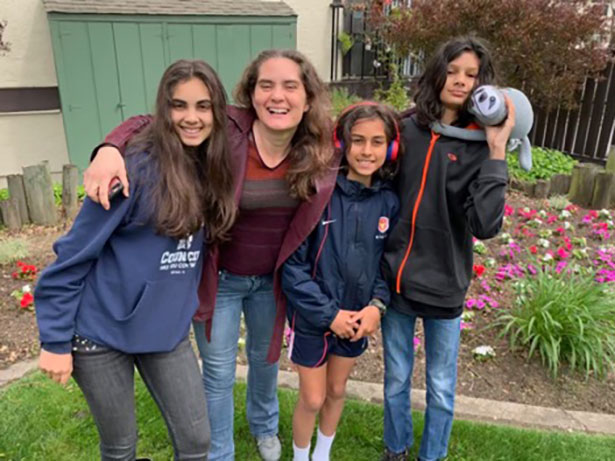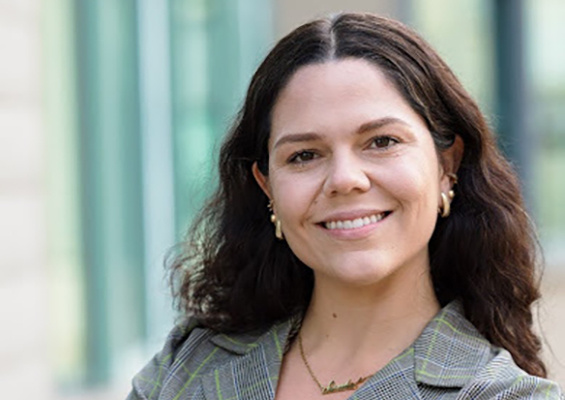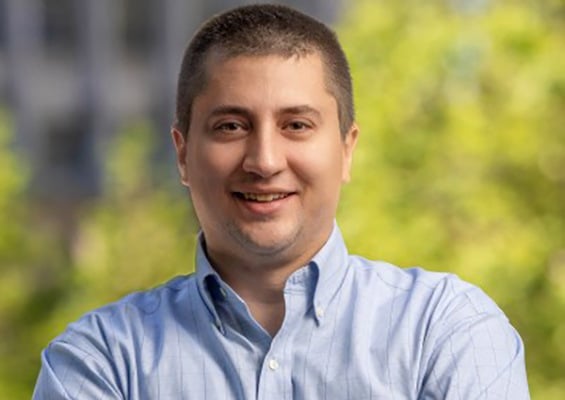Ana Simoes, MBA 20, chief of staff, AI Inference Products Group, says Berkeley Haas has changed her in ways she never expected. Now she’s passionate about using technology to make an impact on society and empowering others to see the value in an MBA.

Why did you decide to get your MBA?
I have been working in artificial intelligence strategy for one of Intel’s major AI accelerator products. I joined Intel six years ago as a software engineer and later joined a strategic effort to drive AI for Intel as a technical consultant. Soon I realized I needed to expand my business acumen. I came to Haas ready to grow my understanding of corporate strategy. It's an area that fascinates me.
Haas has expanded my horizons though. As much as I love AI, I’m really excited about the impact technology can have—and already has had—on society. Technology democratizes transformation by making change accessible.
I came to Haas thinking that big companies make big change in the world. Instead, I was surprised to learn that entrepreneurship is a good vehicle for that. In my entrepreneurship class I realized the transformational power of this new way of thinking.
How have your views of what’s possible—for yourself, for society—changed while at Haas?
I went to Seminars in International Business (SIB) in Brazil this year. I have family and a lot of friends there, so I knew even before we arrived that the people there are going through a very demoralized phase right now partly because of the political situation.
Historically, Brazilians have been culturally passive. We look at what’s happening as a series of constraints. We feel victimized. We don’t react. That’s when I had my big aha moment about entrepreneurship.
Entrepreneurship is the process of taking things into your own hands. You start out by looking at problems as opportunities. You’re not just complaining about the problem; you are asking yourself, ‘How can I solve this in a way that is sustainable for me and for the environment that I’m in, for the whole ecosystem?’ You think about it in a systematic way. The moment you see a problem, you actually have the tools to start thinking of a solution. This is a very empowering process.
I would like to inspire people in Brazil to adopt that mindset for themselves and start looking at problems as things they can solve.
I didn’t have anyone reach out to me and tell me to [get my MBA]. Now I’m raising my hands in the air to say you do belong here."
Tell us more about your involvement as VP, Diversity and planning the Diversity Summit.
The Evening & Weekend MBA program has been transformational to me in a way I never anticipated. Berkeley Haas opened up my mind on a level I had never experienced before. It was very empowering. That’s why I’m excited about the Diversity Summit.
I could’ve come to Haas—I should’ve come to Haas—earlier. I didn’t for many reasons: finances, family, and time. More importantly, an MBA just wasn’t part of my view of the world. That’s where the Diversity Summit plays a huge role, specifically for Latinx communities. I believe that a lot of Latinos think like I used to from a heritage point of view. They don’t see themselves as a part of an MBA program. That’s why reaching out to these communities and changing that perception, making them understand the value this can have, is crucial.
I’m most excited about the student-led sessions where people can speak with us about their experience and we can share how to be successful at Haas. I want to make them see themselves in this position. All the arguments I had against it back then were workable. But at that time, I didn’t have anyone reach out to me and tell me to go for it. Now I’m raising my hands in the air to say you do belong here.
How would you describe your fellow classmates and the student community at Haas?
I came to Haas in a very different place in my life than most of my colleagues. At age 44, I am older than my classmates. I am the mother of three teenagers. Of course, I am Latina.
I was pleased to see that I’m surrounded by very talented people who have been able to help me, talk me through things. It’s been a great opportunity in the sense that first you build a community.
You get to know people you can access on a day-to-day basis, people who are relevant for your career and your field of work. They are high-caliber, smart , open-minded people. I’ve been part of a lot of very open, direct, high-quality conversations. That has helped me become better at putting my own arguments out there and standing up for my own values.
As a whole, the community has embraced me. At first I had the sense that ‘I’m too old. It’s going to be weird. I’m never going to fit in.’ None of that happened.
At Haas, what are our strengths and weaknesses around the issue of diversity? Areas for improvement?
Generally, the people are open-minded. There’s an awareness about diversity and a strong desire to get involved and understand it. There is a genuine understanding that diversity is important from a business perspective, from a career perspective, from a world perspective—that diversity is something we need to embrace and improve and increase.
That said, that’s still not happening de facto in the program. If you look around in the classrooms, they’re not very diverse demographically. Part of that is because of who works and lives here in the Bay Area. Right now, diversity is more of an aspirational goal. We need to move it into a more substantive goal, one that people would get involved in a more hands-on way.
What would your advice be to help make that transition—to start being less aspirational and more actionable in diversifying our community?
We could make diversity, equity and inclusion a stronger part of the orientation process itself. Putting ourselves out there to say we are diverse. We want to be diverse. We want the world to be more diverse. We also could make diversity play a stronger part in the core curriculum. We touched on it, but it wasn’t fully developed.
When we think of diversity, it should go beyond racial aspects. Making the program more equitable, for instance for mothers, will help us elevate the number of women who apply. A lot of women don’t apply because they already have kids or they’re thinking about having kids, and they don’t see themselves doing that and getting an MBA at the same time. Breaking that thought process will help us bring more women to the program. Bringing more women into the program will help change the income gap. As a mother myself who went through the program, I want to see more mothers and parents see that an MBA can be part of their life.
If we embrace diversity as a school, and we see ourselves as agents of diversity, we will start making a bigger change as opposed to just talking about it.









